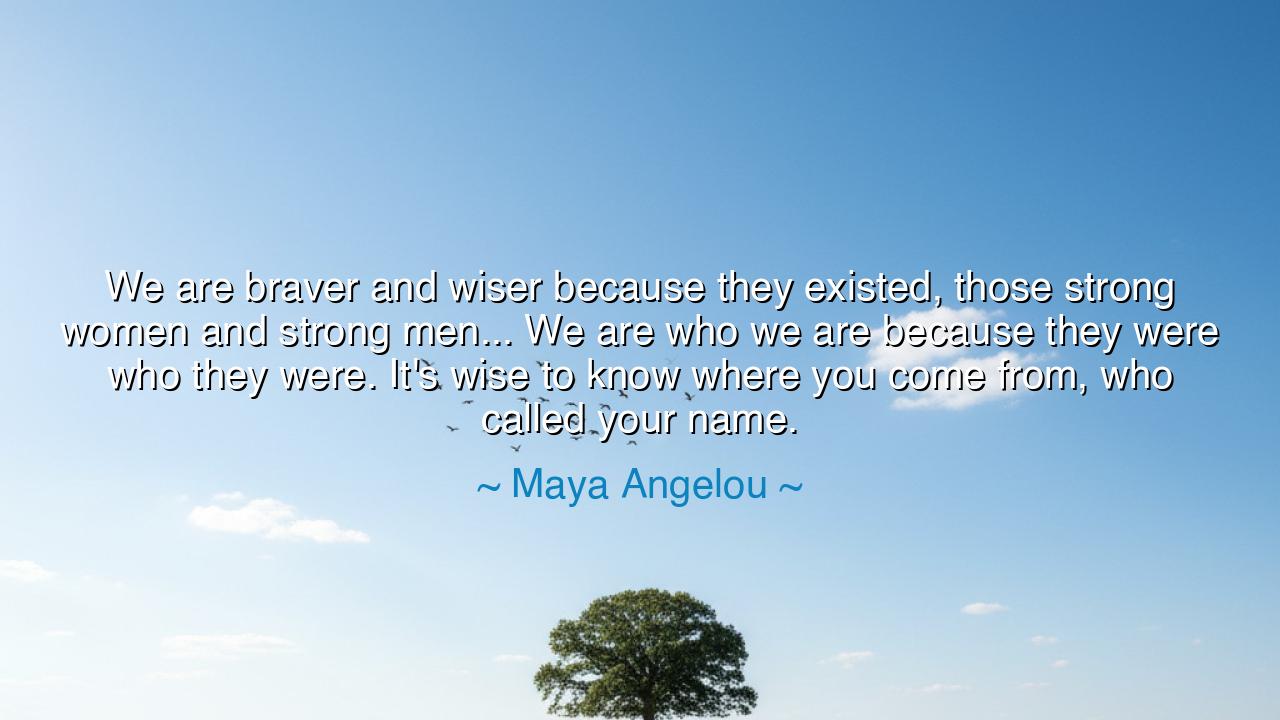
We are braver and wiser because they existed, those strong women
We are braver and wiser because they existed, those strong women and strong men... We are who we are because they were who they were. It's wise to know where you come from, who called your name.






"We are braver and wiser because they existed, those strong women and strong men... We are who we are because they were who they were. It's wise to know where you come from, who called your name." These words, spoken by the great Maya Angelou, hold within them a profound truth—a call to remember the ancestors who came before us and shaped the very foundation of our existence. Angelou speaks of the strength and wisdom of those who have walked this Earth before us, and how their legacy, their courage, and their choices continue to resonate through the generations. Our lives, she reminds us, are not solitary; they are connected to the past, and it is by understanding where we come from and who has called our names that we find meaning in who we are today.
From the ancient world, societies were built upon the memories of those who came before. The Greeks, with their epic poetry, often spoke of the heroes and gods of old, whose deeds shaped the destiny of nations. In Homer’s Iliad and Odyssey, the Greeks did not simply tell the stories of great warriors and gods, but rather, they told the stories of those who laid the groundwork for human triumphs and failures. The Greeks understood that their present existence was a continuation of the struggles, the sacrifices, and the victories of those who had come before them. Angelou’s words resonate with this ancient wisdom: to honor and understand our ancestors is to understand ourselves, and through that understanding, we find the courage to move forward.
Consider the story of Spartacus, the gladiator who led a rebellion against the Roman Empire in the 1st century BC. Spartacus, though born into slavery, became a symbol of freedom and resilience. His courage, his defiance, and his unwavering fight for justice have influenced countless generations. Spartacus’ story was passed down through oral traditions, and his legacy inspired future generations to fight for liberty. While his rebellion was ultimately crushed, the spirit of his resistance lived on in the hearts of those who followed. In this way, the ancestors—the strong men and women who fought for freedom and justice—continue to shape the world we live in today. They called our names, and their struggles paved the way for our own fight for liberation.
Angelou’s reflection is not just a look to the past; it is a call to recognize how history and heritage are intertwined with our personal identities. Harriet Tubman, another figure who Angelou likely revered, exemplifies this principle. Tubman, known for her role in leading slaves to freedom via the Underground Railroad, was an embodiment of strength, bravery, and purpose. She did not simply liberate others; she reshaped the course of history. Her legacy lives not only in the freedom she fought for but in the courage she instilled in others. Tubman’s name still calls out to us, as her story continues to inspire those who seek justice and equality. We are who we are because Harriet Tubman was who she was—an unstoppable force whose bravery changed the world.
But the truth Angelou speaks of extends beyond the historic figures of legend. It is found in the everyday heroes—the mothers, fathers, grandmothers, grandfathers, and teachers who imparted their wisdom, their love, and their struggles to us. The lessons we carry from those who raised us are often more important than the grand narratives of history, for it is in the small acts of courage and sacrifice that we find our truest selves. Maya Angelou herself lived through a lifetime of struggle, overcoming racial prejudice, poverty, and personal hardship. And yet, it was her resolve to continue, to rise above the challenges that shaped her into the woman whose words still inspire millions. She, like the ancestors she speaks of, called out to the generations to come, and in her voice, we find our own strength.
The lesson of Angelou’s quote is a powerful reminder: we are the products of those who came before us, and our lives are richer when we understand the roots from which we spring. Just as the ancient cultures honored their ancestors and saw themselves as part of an ongoing story, so too must we. Honor your heritage, know the struggles and triumphs of those who paved the way for you, and carry that wisdom forward into the world. Whether your ancestors were kings, warriors, poets, or laborers, their lives shaped the opportunities you now have. You are their legacy, and you owe it to them to live with the same courage, wisdom, and integrity that they displayed.
In your own life, take time to reflect on your roots. Who called your name? Who shaped your destiny? Know that the challenges you face today are not just your own, but part of a larger journey that stretches across time. Honor the lessons of those who came before you, and use their strength as fuel for your own journey. As Maya Angelou reminds us, it is wise to understand where you come from and the forces that shaped you. Remember that the strength of your ancestors lives on in you—use that knowledge to walk forward with purpose, grace, and courage.






AAdministratorAdministrator
Welcome, honored guests. Please leave a comment, we will respond soon